Form 0920-1071 Provider Acceptibility Survey
Generic Clearance for the Collection of Qualitative Feedback on Agency Service Delivery
Acceptaiblity Survey_Peds_Providers_w Footer final
Acceptability Survey of ARI Campaign for University of Utah Pediatric Clinic Champions
OMB: 0920-1071
Form Approved
OMB No. 0920-1071
Expires 02/28/2021
Acceptability Survey of ARI Campaign for University of Utah Pediatric Providers
Title: Improving Outpatient Antibiotic Use Through Implementation and Evaluation of Core Elements of Outpatient Antibiotic Stewardship
Introduction: From January 2018 through July 2019 your clinic participated in a study of an intervention designed to improve antibiotic prescribing for acute upper respiratory tract infections (ARI) such as acute sinusitis, acute otitis media, and non-specific upper respiratory tract infections.
The intervention (called ARI Campaign) emphasized the use of a dashboard report (a.k.a. audit-feedback) and academic detailing conducted by Emily Thorell, MD. MSCI.
The dashboard report included a summary of individual clinic providers’ distribution of ARI diagnoses and antibiotic prescribing patterns for treatment of ARI.
Academic detailing visits consisted of personalized one-on-one or small group educational sessions to discuss antibiotic prescribing for ARIs.
Patient education materials were provided to your clinic team at the start of the intervention. You have been identified as a site champion or peer within the facility who helped facilitate the intervention in a clinic that participated in the study.
Purpose: This survey will solicit your opinions on the ARI Campaign elements and suggestions for improvement. Your responses will be used to refine delivery of the ARI Campaign and gauge provider acceptability of the interventional approach.
Potential identifiable information submitted by you will only be available to the research team, and results shared with local facility investigators or in final reports will be de-identified and reported in aggregate.
Thank you for your consideration to participate!
Instructions: Please answer the following question by selecting the values that best describe your opinions. Brief descriptions of ARI Campaign resources or activities and additional instructions will be provided in bold lettering.
Demographics
1. Which best describes the practice setting you most frequently work in? Please check the box below.
Hospital-based Primary Care
Emergency Department
Community-Based Outpatient Clinic
2. Which best describes your professional qualifications? Please check the box below.
Doctor of Medicine (MD)
Doctor of Osteopathy (DO)
Nurse Practitioner
Physician Assistant
MD/DO Resident
3. Which best describes your specialty? Please check one box below.
Internal Medicine
Emergency Medicine
Family Practice
Pediatrics
Other specialty (describe):
_____________________________________
4. What is your age? (Fill in the Blank)
_________________
5. What is your sex? Male Female
Engagement with Dashboard Reports
A link to the dashboard report was emailed to providers at the beginning of the ARI Campaign and periodically every 2-4 months afterwards for at least 12 months during the study.
I received and reviewed at least one dashboard report on my individual antibiotic prescribing patterns for ARIs. Please check the box below.
Yes No (If no stop here)
I received orientation to the purpose and report components of the personal dashboard report. Please circle a number below.
1: |
2: |
3: |
4: |
5: |
6: |
7 |
Strongly Disagree |
|
|
Neutral |
|
|
Strongly Agree |
I understood the content of my dashboard report and how the data related to my antibiotic prescribing practices. Please circle a number below.
1: |
2: |
3: |
4: |
5: |
6: |
7 |
Strongly Disagree |
|
|
Neutral |
|
|
Strongly Agree |
My dashboard report provided useful information about my antibiotic prescribing practices. Please circle a number below.
1: |
2: |
3: |
4: |
5: |
6: |
7 |
Strongly Disagree |
|
|
Neutral |
|
|
Strongly Agree |
The data within my dashboard report generally reflected my antibiotic prescribing practices. Please circle a number below.
1: |
2: |
3: |
4: |
5: |
6: |
7 |
Strongly Disagree |
|
|
Neutral |
|
|
Strongly Agree |
I feel that comparison of my antibiotic prescribing practices relative to my practice location was insightful. Please circle a number below.
1: |
2: |
3: |
4: |
5: |
6: |
7 |
Strongly Disagree |
|
|
Neutral |
|
|
Strongly Agree |
I was surprised by the findings of my antibiotic prescribing relative to my practice location. Please circle a number below.
1: |
2: |
3: |
4: |
5: |
6: |
7 |
Strongly Disagree |
|
|
Neutral |
|
|
Strongly Agree |
Understanding my prescribing practices through review of my dashboard report improved my antibiotic prescribing practice. Please circle a number below.
1: |
2: |
3: |
4: |
5: |
6: |
7 |
Strongly Disagree |
|
|
Neutral |
|
|
Strongly Agree |
I feel my diagnostic coding practice improved as I understood my prescribing practices after reviewing my dashboard report. Please circle a number below.
1: |
2: |
3: |
4: |
5: |
6: |
7 |
Strongly Disagree |
|
|
Neutral |
|
|
Strongly Agree |
The use of a dashboard report is an acceptable method for improving ARI antibiotic prescribing. Please circle a number below.
1: |
2: |
3: |
4: |
5: |
6: |
7 |
Strongly Disagree |
|
|
Neutral |
|
|
Strongly Agree |
Engagement with Academic Detailing:
Academic detailing visits conducted by Emily Thorell, MD. consisted of personalized one-on-one or small group educational sessions to discuss antibiotic prescribing for ARIs. These visits were primarily scheduled to coincide around the time you received your first dashboard report, but you may have participated in additional academic detailing visits during the study.
Please mark all that apply.
I participated in an initial academic detailing discussion on ARI antibiotic prescribing in a one-on-one or small group (<3 providers) setting delivered by a peer clinician.
I participated in at least one additional follow-up academic detailing discussion on ARI antibiotic prescribing in a one-on-one or small group setting (<3 providers) delivered by a peer clinician.
(If neither box above is marked skip questions 17-22)
Communication with the peer clinician during the academic detailing sessions was conversational. Please circle a number below.
1: |
2: |
3: |
4: |
5: |
6: |
7 |
Strongly Disagree |
|
|
Neutral |
|
|
Strongly Agree |
I feel I learned useful information about the diagnosis and management of ARIs during the academic detailing sessions. Please circle a number below.
1: |
2: |
3: |
4: |
5: |
6: |
7 |
Strongly Disagree |
|
|
Neutral |
|
|
Strongly Agree |
The peer clinician who engaged me during the academic detailing session adequately addressed my concerns about antibiotic prescribing issues related to ARIs. Please circle a number below.
1: |
2: |
3: |
4: |
5: |
6: |
7 |
Strongly Disagree |
|
|
Neutral |
|
|
Strongly Agree |
Academic detailing sessions provided additional insight on ARI management that supplemented the dashboard reports. Please circle a number below.
1: |
2: |
3: |
4: |
5: |
6: |
7 |
Strongly Disagree |
|
|
Neutral |
|
|
Strongly Agree |
Academic detailing sessions are an acceptable method to improve ARI antibiotic prescribing. Please circle a number below.
1: |
2: |
3: |
4: |
5: |
6: |
7 |
Strongly Disagree |
|
|
Neutral |
|
|
Strongly Agree |
Please provide any additional comments or suggestions for improvement concerning the use of dashboard reports and/or the academic detailing process? (Short Answer)
Gauging Additional Intervention Components
Other available ARI Campaign tools included: Intermountain Care Process Model, the ARI Quick Reference Chart in the Dashboard Report, and Patient Education Handouts. Please answer the following questions on the usefulness of these tools.
Intermountain Care Process Model
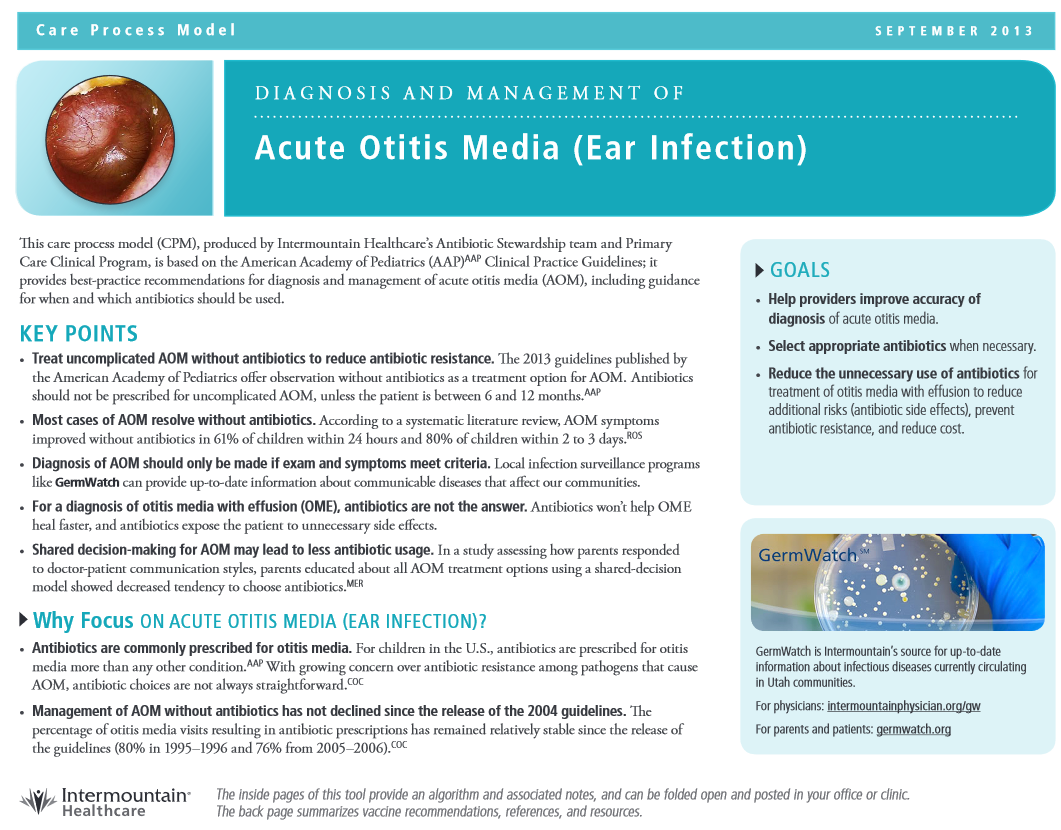
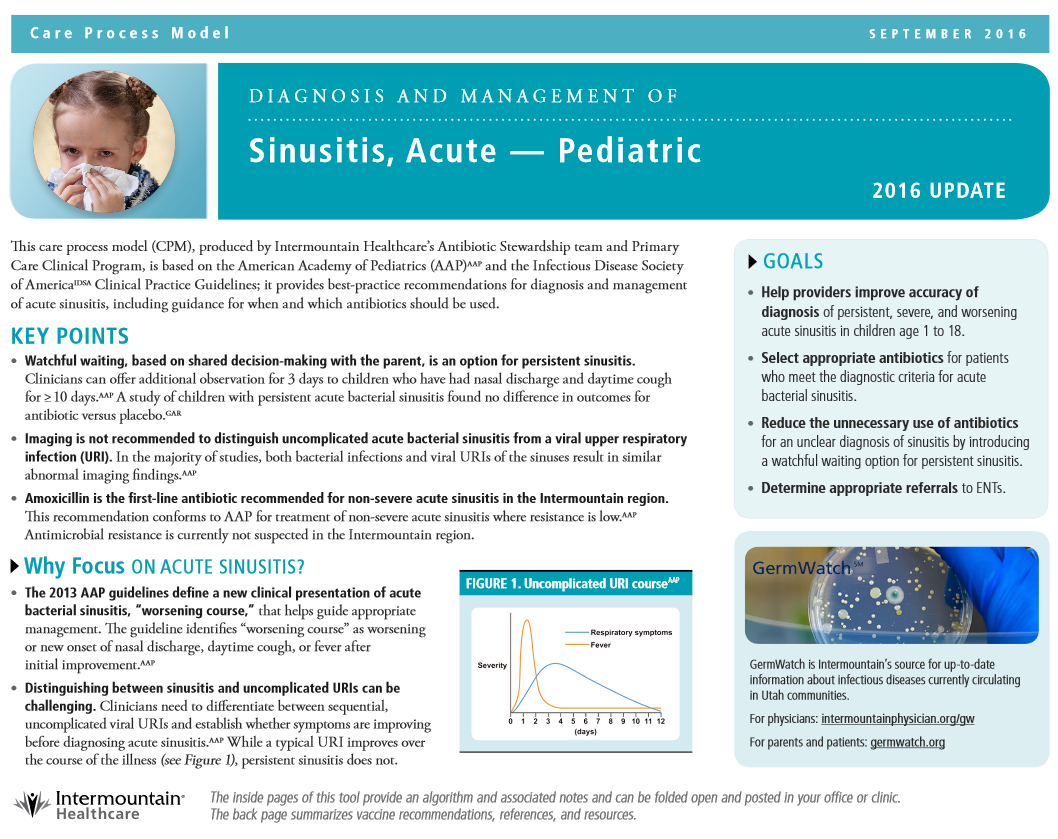
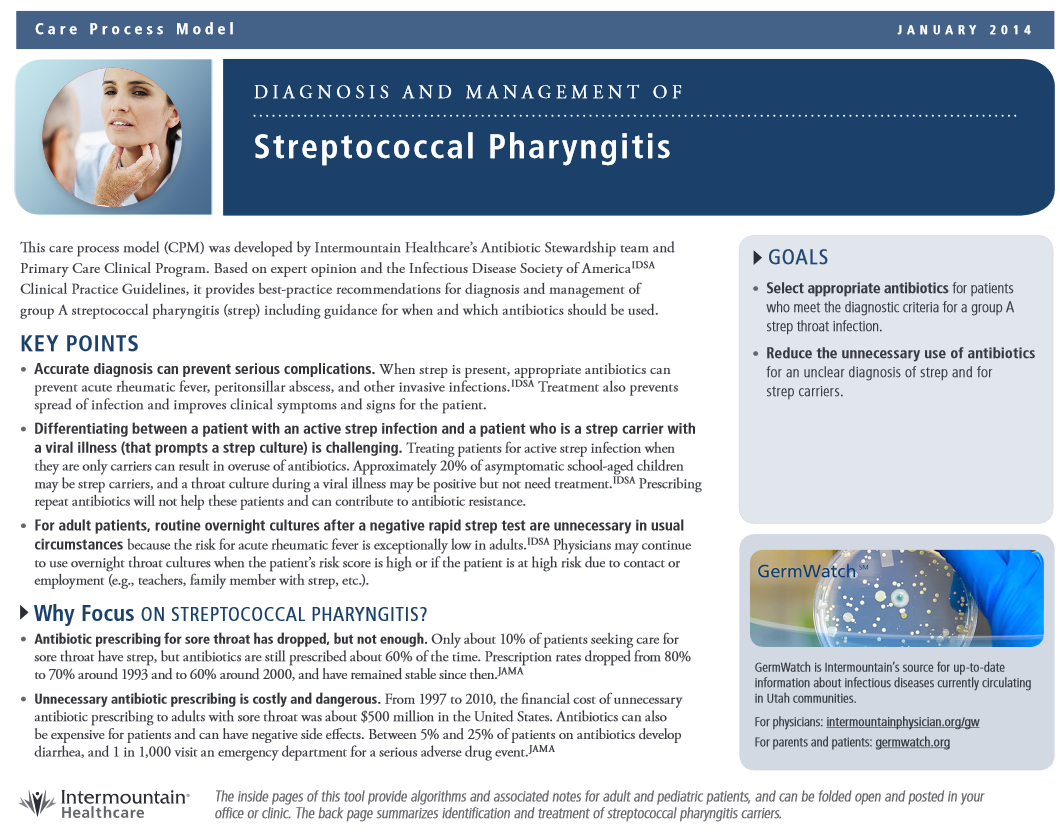
I received a Care Process Model guide or public website link
Yes No (If no skip question 24)
I used the Care Process Model Guide when treating patients with ARIs. Please circle a number below.
1: |
2: |
3: |
4: |
5: |
6: |
7 |
Never |
|
|
Sometimes |
|
|
Always |
Quick Reference Chart in the dashboard report - provides current guidelines concerning diagnosis, prescribing, and preferred therapy.
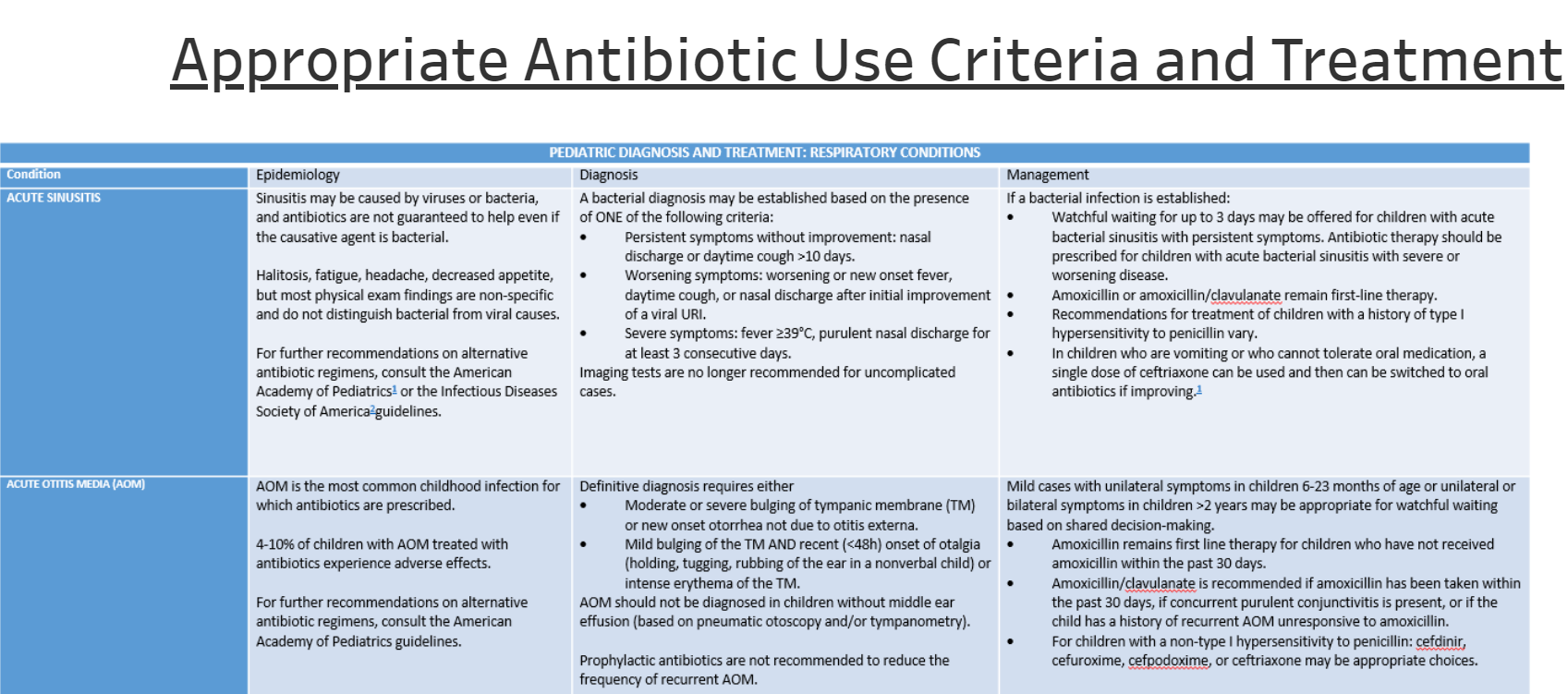
I received the Quick Reference Chart contained in the Dashboard Report
Yes No (If no skip question 26)
I used the Quick Reference Chart when treating patients with ARIs. Please circle a number below.
1: |
2: |
3: |
4: |
5: |
6: |
7 |
Never |
|
|
Sometimes |
|
|
Always |
Patient Education. Patient education handouts concerning the appropriate use of antibiotics within ARIs.
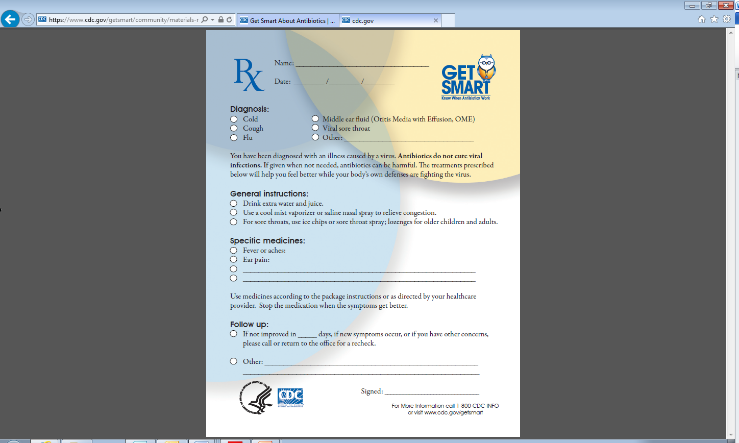
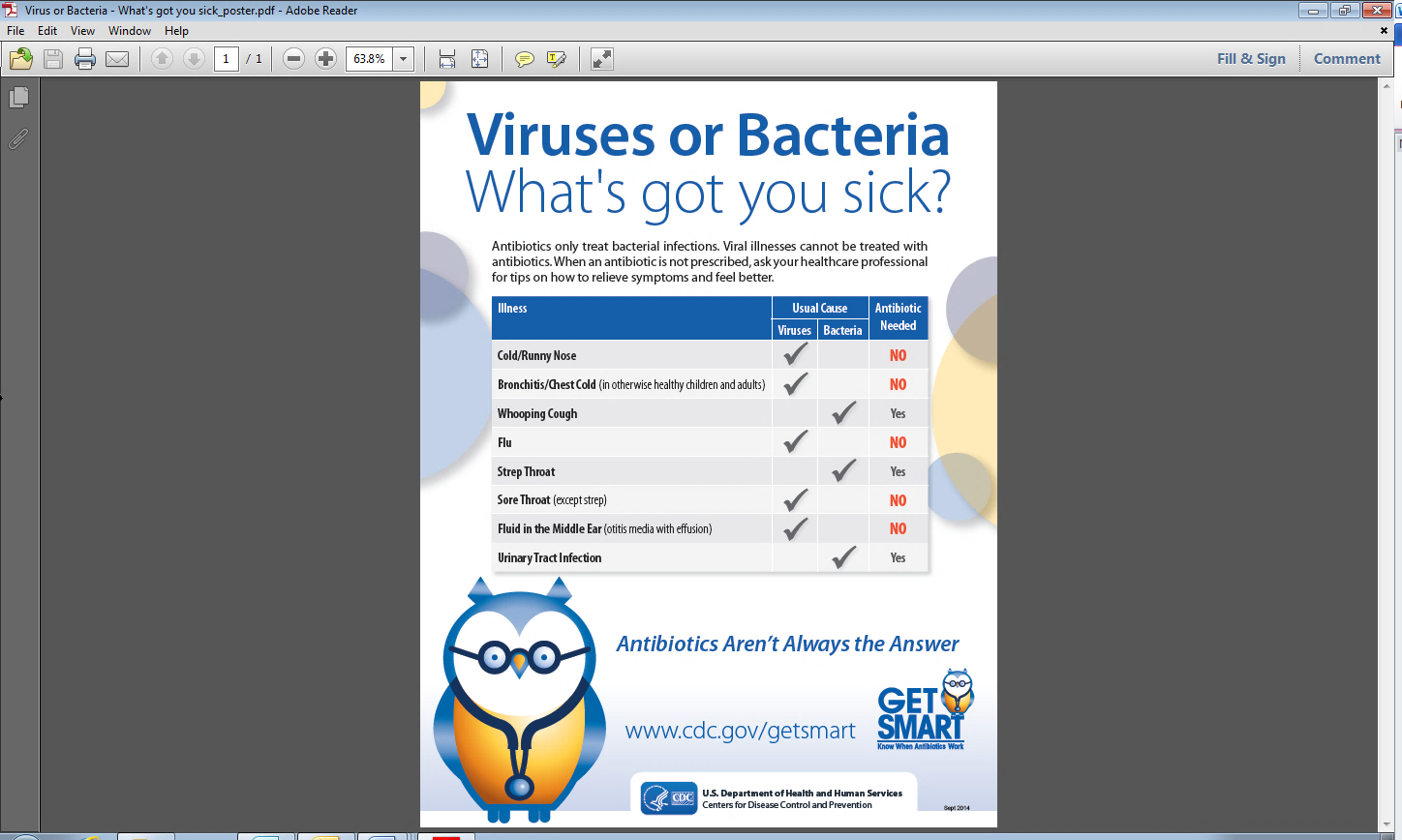
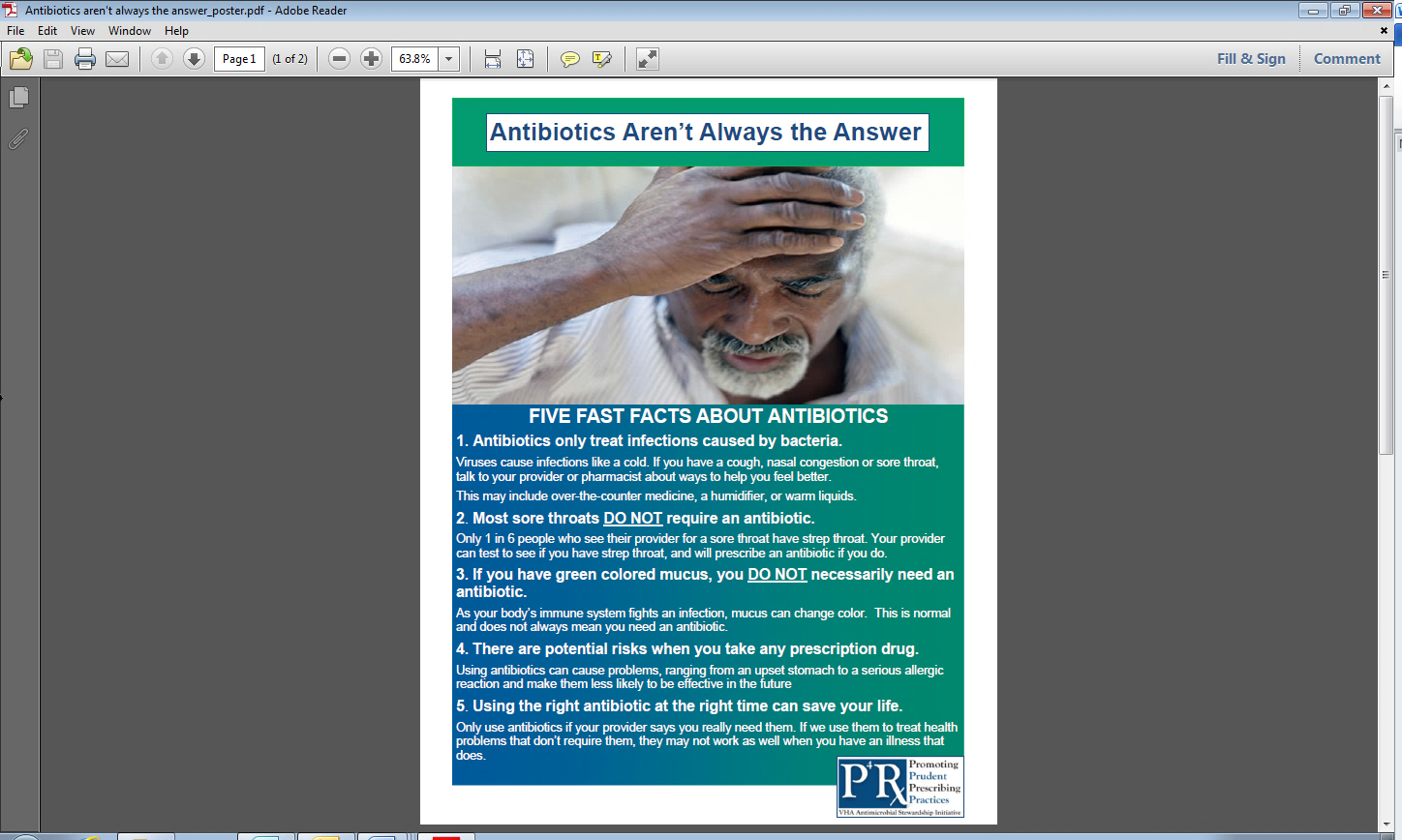
During the ARI Campaign I had access to patient education handouts.
Yes No (If no skip question 28)
I utilized the patient education handouts during ARI encounters. Please circle a number below.
1: |
2: |
3: |
4: |
5: |
6: |
7 |
Never |
|
|
Sometimes |
|
|
Always |
Please rank the following in order of importance from least useful to most useful for the management of ARIs.
Group kick-off presentation of the ARI Campaign purpose, ARI diagnosis and treatment recommendations, and intervention tools.
Dashboard reports on my diagnostic and antibiotic prescribing patterns for treatment of ARI. Which include personalized antibiotic prescribing rates, ARI diagnosis, and preferred antibiotic treatment for acute sinusitis and pharyngitis
One-on-one academic detailing to discuss diagnosis and antibiotic prescribing for ARIs
Patient education materials to be provided within an ARI encounter
Intermountain Care Process Model
Quick Reference Chart contained in the Dashboard Report
I feel my antibiotic prescribing practice for ARIs have improved over the past 12-18 months. Please circle a number below.
1: |
2: |
3: |
4: |
5: |
6: |
7 |
Strongly Disagree |
|
|
Neutral |
|
|
Strongly Agree |
Please provide any additional comments or suggestions concerning the ARI Campaign. (Short Answer)
Public reporting burden of this collection of information is estimated to average 30 minutes per response, including the time for reviewing instructions, searching existing data sources, gathering and maintaining the data needed, and completing and reviewing the collection of information. An agency may not conduct or sponsor, and a person is not required to respond to a collection of information unless it displays a currently valid OMB control number. Send comments regarding this burden estimate or any other aspect of this collection of information, including suggestions for reducing this burden to CDC/ATSDR Information Collection Review Office, 1600 Clifton Road NE, MS D-74, Atlanta, Georgia 30333; ATTN: PRA (0920-1071).
Page
Version 1 (2/28/2019)
| File Type | application/vnd.openxmlformats-officedocument.wordprocessingml.document |
| File Modified | 0000-00-00 |
| File Created | 0000-00-00 |
© 2026 OMB.report | Privacy Policy